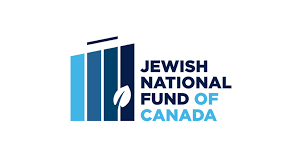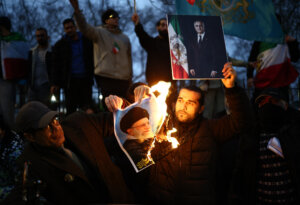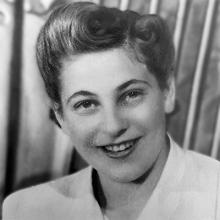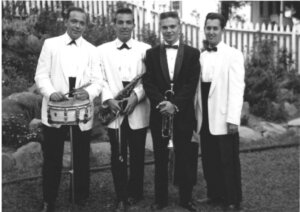Local News
JNF Canada says a new charity called “Friends of JNF Canada” will be able to issue tax receipts to donors

By BERNIE BELLAN (Sept. 11, 2025) It’s a complicated – and very confusing story – and it goes back to an earth-shaking decision issued by the Canada Revenue Agency on August 10, 2024. That decision, which was published in the Canada Gazette (which is where an announcenment about any charity whose charitable status has been revoked is published) was to revoke the Jewish National Fund Canada’s charitable status.
To give you an idea how important charitable donations have been to JNF Canada, according to the most recent audited financial statements that are available, “In 2023, JNF Canada received $20.2 million in donations and had a total revenue of $22.2 million.”
We’ve written numerous times about what led up to CRA’s decision to revoke JNF Canada’s charitable status and the resulting aftermath – in which JNF Canada was thrown into disarray.
Much of the reporting on this story was done by Ellen Bessner, writing for the Canadian Jewish News. Bessner was stolid in her research and although a good portion of what she wrote laid the blame for what happened to JNF Canada at the feet of JNF Canada itself, she provided exhausting detail about what lay behind CRA’s decision. If you want to read past articles that follow the chronology of events following that August 10, 2024 decision by CRA, you can simply enter JNF in the search engine on jewishpostandnews.ca, and you’ll find a great many stories about not only what led up to CRA’s decision to remove JNF Canada’s charitable status, but what steps JNF Canada took subsequent to that momentous decision.
During the past 13 months though, JNF Canada has been embroiled in a legal battle against CRA on different levels – in two different courts: The Federal Court and the Federal Court of Canada. You’ll have to read an article posted on June 17 this year on jewishpostandnews.ca to understand the difference between the two courts. For the purpose of this article, however, it is only important to note that JNF Canada’s appeal to the Federal Court was turned down by that court – for technical reasons, i.e., the Federal Court ruled that it was not the proper court to hear the particular matter that JNF Canada had brought forward; however, the appeal to the Federal Court of Canada is still underway. It may take quite some time before that court issues a decision and, if it also goes against JNF Canada, there is a strong likelihood JNF Canada will take its case all the way to the Supreme Court of Canada. The upshot is that it may be years before the legal battle JNF Canada has been waging with CRA may be resolved.
In the meantime though, JNF Canada had been working to come up with a solution to the challenge of its having been deregistered by CRA as a charity able to issue tax receipts.
On September 2, JNF Canada sent out an email to its supporters in which it gave a preview of what was about to happen. That email noted: “This past year has been challenging for JNF Canada and for Jewish communities across the country.
“Even without charitable status and amid an ongoing legal dispute with the CRA JNF Canada has remained committed to its mission… The absence of our charitable status has limited our ability to operate effectively and our supporters have told us they want their donations to have the full impact, including the ability to receive charitable receipts… In response wonderful friends stepped forward to dedicate their charity to caring out similar work and have appropriately renamed it “Friends of JNF Canada” (emphasis mine).
What did that mean? I wondered. The email also noted that “JNF Canada will continue to operate as it fights its legal battle against the CRA, for its right to fair treatment.”
So, JNF Canada is still alive as an organization called JNF Canada – but it has now managed to find a way to issue tax receipts to its supporters. The September 2 email didn’t go into any detail as to what “Friends of JNF Canada” was – and how it had come about.
But, in a story issued by the CJN on September 4, it was noted that “JNF Canada, whose charitable tax status was revoked by the Canada Revenue Agency (CRA) in 2024, has created a new charitable entity linked to the organization. The new charity, Friends of JNF Canada, officially launches on Sept. 8.”
“A new charitable entity?” I wondered. What did that mean?
The CJN story, written by Jonathan Rothman, went on to note that “Friends of JNF Canada will have the ability to issue charitable tax receipts, (Nathan) Disenhouse (National President, JNF Canada) told the National Post in an interview, saying the new organization’s fundraising for Israel would be done ‘in a similar way that JNF Canada did, but with the ability to issue tax receipts.’
My reaction upon reading Rothman’s story was: “What? This sounds just like JNF Canada, but with a new name. Isn’t this really an end-around that would allow JNF Canada to circumvent CRA’s removal of JNF Canada’s charitable status?”
So, on September 5, I wrote to CRA, asking this question: “Can you confirm that ‘Friends of JNF Canada’ is now a registered charity, able to issue tax receipts?”
I received a response that same day saying that someone would get back to me with an answer.
The answer arrived September 10: “The public may consult the CRA’s List of charities and certain other qualified donees to confirm whether an organization is a registered charity or other qualified donee. For clarity, the public may also confirm in the same registry: the registration number, the current status of the charity, the date since the status has been valid, the type of qualified donee, the designation, and the website of a specific charity. We can confirm that Friends of JNF (emphasis mine) was registered as a public foundation effective September 22, 2022. Note that the governing documents in our records reflect a legal name change from ‘The Benzimra Foundation’ to ‘Friends of JNF’ effective August 14, 2025.”
Note that the email from CRA referred twice to the charity as “Friends of JNF,” not “Friends of JNF Canada.” Was that just a typing error or was it more significant? I again wondered.
Adding to the confusion, JNF Canada issued another email on September 10, in which it said, in part, that …wonderful friends stepped forward to dedicate their charity to carrying out similar work (to what JNF Canada had been doing) and have appropriately renamed it Friends of JNF Canada. With our Board of Director’s (sic.) full endorsement this organization will continue supporting the kinds of projects that have always defined JNF Canada’s mission: serving Israelis in need through charitable projects that help the vulnerable, enhance environmental sustainability, and support the mental & physical health of Israelis in need.”That email did not name the Benzimra Foundation as the charity that had agreed to change its name to Friends of JNF Canada but, as you can see in the email from CRA, CRA disclosed that information.
We wondered whether Friends of JNF and Friends of JNF Canada are one and the same. We received an explanation from Lance Davis, who was formerly CEO of JNF Canada and is now CEO of Friends of JNF Canada: “Our lawyer filed the name Friends of JNF. We were given additional input from supporters that it may be confusing as there are many JNFs around the world and we should specify Canada so that it’s clear that we are an independent Canadian charity funding Canadian directed projects. We are not a subsidiary of any other charity, as we are totally independent.
“Therefore, we decided to operate as Friends of JNF Canada.
“It is extremely common for businesses to have an operating name that is slightly different that the registered name. At this point we have so much to do to get our activities and campaigns started, so we will not be revisiting this now. However, in the future, the board may want to do so.”
But, in an October 2024 article in CJN, it was noted that another Canadian charity known as the Ne’eman Foundation had also had its charitable status revoked in August 2024. Subsequently, that same article reported, “the organization, which distributes funds to various causes in Israel, began instructing prospective donors to contribute through another recently formed Canadian charity (emphasis mine).
“Six weeks later, Canadian officials imposed a one-year suspension on that charity, called the Emunim Fund, according to its listing on the Canada Revenue Agency website.
“CRA regulators had previously raised concerns about particular Ne’eman Foundation projects in Israel, and a volunteer with Jewish pro-Palestinian group had alleged to the agency that the Ne’eman Foundation was using the Emunim Fund to skirt the revocation (emphasis mine).
“The agency has not publicly disclosed why it suspended the Emunim Fund, and said in a statement that it is barred by law from commenting on individual cases.”
Thus, there are two questions for which we’re awaiting answers: Is the name of the charity which JNF Canada now says will be able to issue tax receipts to donors who might previously have donated to JNF Canada “Friends of JNF” (as the CRA email said was the name) or is it “Friends of JNF Canada,” which was what the emails from JNF Canada says it its name?
Second, although the CRA email would seem to indicate that it has granted registration to this new charity – whether its name is Friends of JNF or perhaps Friends of JNF Canada, given CRA’s previous revocation of the registration of a charity linked to Israel when it changed its name from the Ne’eman Foundation to the Ne’eman Fund, will CRA follow suit and suspend the new charity whose name closely resembles JNF Canada’s name?
As I wrote – this is all so confusing. Even though spokespersons for both CRA and JNF Canada have been quick to respond to emails from me in which I’ve been asking questions trying to sort out exactly what has been going on, it seems that each email leads me to ask yet more questions.
If I receive more information from either CRA or JNF Canada that helps to clarify the questions I’ve asked, I’ll update this story – so keep checking back.
Local News
Winnipeg Jewish Theatre breaks new ground with co-production with Rainbow Stage

By MYRON LOVE Winnipeg Jewish Theatre is breaking new ground with its first ever co-production with Rainbow Stage. The new partnership’s presentation of “Fiddler on the Roof” is scheduled to hit the stage at our city’s famed summer musical theatre venue in September 2026.
“We have collaborated with other theatre companies in joint productions before,” notes Dan Petrenko, the WJT’s artistic and managing director – citing previous partnerships with the Segal Centre for the Performing Arts in Montreal, the Harold Green Jewish Theatre in Toronto, Persephone Theatre in Saskatoon and Winnipeg’s own Dry Cold Productions. “Because of the times we’re living through, and particularly the growing antisemitism in our communities and across the country, I felt there is a need to tell a story that celebrates Jewish culture on the largest stage in the city – to reach as many people as possible.”
Last year, WJT approached Rainbow Stage with a proposal for the co-presentation of “Fiddler on the Roof.” Rainbow Stage management was really enthusiastic in their response, Petrenko reports.
“We are excited to be working with Winnipeg’s largest musical theatre company,” he notes. “Rainbow Stage has an audience of more than 10,000 people every season. Fiddler is a great, family-oriented story and, through our joint effort with Rainbow Stage, WJT will be able to reach out to new and younger audiences.”
“We are also working to welcome more diverse audiences from other communities, as well as newcomers – families who have moved here from Israel, Argentina and countries of the former Soviet Union.”
Helping Petrenko to achieve those goals are two relatively new and younger additions to WJT’s management team. Both Company Manager Etel Shevelev, and Head of Marketing Julia Kroft are in their 20s – as is Petrenko himself.
Kroft, who is also Gray Academy’s Associate Director of Advancement and Alumni Relations, needs little or no introduction to many readers. In addition to her work for Gray Academy and WJT, the daughter of David and Ellen Kroft has been building a second career as a singer and actor. Over the past few years, she has performed by herself or as part of a musical ensemble at Jewish community events, as well as in various professional theatre productions in the city.
Etel Shevelev is also engaged in a dual career. In addition to working full time at WJT, she is also a Fine Arts student (majoring in graphic design) at the University of Manitoba. Outside of school, she is an interdisciplinary visual artist (exhibiting her work and running workshops), so you can say the art world is no stranger to her.
(She will be partcipating in Limmud next month as a member of the Rimon Art Collective.)
Shevelev grew up in Kfar Saba (northeast of Tel Aviv). She reports that in Israel she was involved in theatre from a young age. “In 2019, I graduated from a youth theatre school, which I attended for 11 years.” In a sense, her work for WJT brings her full circle.
She arrived in Winnipeg just six years ago with her parents. “I was 19 at the time,” she says.
After just a year in Winnipeg, her family decided to relocate to Ottawa, while she chose to stay here. “I was already enrolled in university, had a long-term partner, and a job,” she explains. “I felt that I was putting down roots in Winnipeg.”
Etel expects to graduate by the end of the academic year, allowing her to focus on the arts professionally full-time.
In her role as company manager, Shevelev notes, she is responsible for communications with donors, contractors, and unions, as well as applying for various grants and funding opportunities.
In addition, her linguistic skills were put to use last spring for WJT’s production of “The Band’s Visit,” a story about an Egyptian band that was invited to perform at a cultural centre opening ceremony in the lively centre of Israel, but ended up in the wrong place – a tiny, communal town in southern Israel. Shevelev was called on to help some of the performers with the pronunciation of Hebrew words and with developing a Hebrew accent.
“I love working for WJT,” she enthuses. “Every day is different.”
Shevelev and Petrenko are also enthusiastic about WJT’s next production – coming up in April: “Ride: The Musical” debuted in London’s West End three years ago, and then went on to play at San Diego’s Old Globe theatre to rave reviews. The WJT production will be the Canadian premiere!
The play, Petrenko says, is based on the true story of Annie Londonderry, a young woman – originally from Latvia, who, in 1894, beat all odds and became the first woman to circle the world on a bicycle.
Petrenko is also happy to announce that the director and choreographer for the production will be Lisa Stevens – an Emmy Award nominee and Olivier Award winner. (The Olivier is presented annually by the Society of London Theatre to recognize excellence in professional London theatre).
“Lisa is in great demand across Canada, and the world really,” the WJT artistic director says. “I am so thrilled that we will be welcoming one of the greatest Jewish directors and choreographers of our time to Winnipeg this Spring.”
For more information about upcoming WJT shows, readers can visit wjt.ca, email the WJT office at info@wjt.ca or phone the box office at 204-477-7515.
Local News
Rising Canadian comedy star Rob Bebenek to headline JCFS’ second annual “Comedy for a Cause”

By MYRON LOVE Last year, faced with a federal government budget cut to its Older Adult Services programs, Jewish Child and Family Service launched a new fundraising initiative. “Comedy with a Cause” was held at Rumor’s Comedy club and featured veteran Canadian stand-up comic Dave Hemstad.
That evening was so successful that – by popular demand – JCFS is doing an encore. “We were blown away by the support from the community,” says Al Benarroch, JCFS’s president and CEO.
“This is really a great way to support JCFS by being together and having fun,” he says.
“Last year, JCFS was able to sell-out the 170 tickets it was allotted by Rumor’s,” adds Alexis Wenzowski, JCFS’s COO. “There were also general public attendees at the event last year. Participants enjoyed a fun evening, complete with a 50/50 draw and raffle. We were incredibly grateful for those who turned out, the donors for the raffle baskets, and of course, Rumor’s Comedy Club.
“Feedback was very positive about it being an initiative that encouraged people to have fun for a good cause: our Older Adult Services Team.”
This year’s “Comedy for a Cause” evening is scheduled for Wednesday, February 25. Wenzowski reports that this year’s featured performer, Rob Bebenek, first made a splash on the Canadian comedy scene at the 2018 Winnipeg Comedy festival. He has toured extensively throughout North America, appearing in theatres, clubs and festivals. He has also made several appearances on MTV as well as opening shows for more established comics, such as Gerry Dee and the late Bob Saget.
For the 2026 show, Wenzowski notes, Rumors’ is allotting JCFS 200 tickets. As with last year, there will also be some raffle baskets and a 50/50 draw.
“Our presenting sponsors for the evening,” she reports, “are the Vickar Automotive Group and Kay Four Properties Incorporated.”
The funds raised from this year’s comedy evening are being designated for the JCFS Settlement and Integration Services Department. “JCFS chose to do this because of our reduction in funding last year by the federal government to this department,” Wenzowski points out.
“Last year alone,” she reports, “our Settlement and Integration Services team settled 118 newcomer families – from places like Israel, Mexico, Brazil, and Argentina. Each year, our program supports even more newcomer families with things like case management, supportive counselling, employment coaching, workshops, programming for newcomer seniors, and more.”
“We hope to raise more than $15,000 through this event for our Settlement and Integration Program,” Al Benarroch adds. “The team does fantastic work, and we know that our newcomer Jewish families need the supports from JCFS. I want to thank our sponsors, Rumor’s Comedy Club, and attendees for supporting us.”
Tickets for the show cost $40 and are available to purchase by calling JCFS (204-477-7430) or by visiting here: https://www.zeffy.com/en-CA/ticketing/jcfs-comedy-for-a-cause. Sponsorships are still available.
Local News
Ninth Shabbat Unplugged highlight of busy year for Winnipeg Hillel

By MYRON LOVE Lindsay Kerr, Winnipeg’s Hillel director, is happy to report that this year’s ninth Shabbat UnPlugged, held on the weekend of January 9-11, attracted approximately 90 students from 11 different universities, including 20 students who were from out of town.
Shabbat UnPlugged was started in 2016 by (now-retired) Dr. Sheppy Coodin, who was a science teacher at Gray Academy, along with fellow Gray Academy teacher Avi Posen (who made aliyah in 2019) – building on the Shabbatons that Gray Academy had been organizing for the school’s high school students for many years.
The inaugural Shabbat UnPlugged was so successful that Coodin and Posen did it again in 2017 and took things one step further by combining their Shabbat UnPlugged with Hillel’s annual Shabbat Shabang Shabbaton that brings together Jewish university students from Winnipeg and other Jewish university students from Western Canada.
As in the past, this year’s Shabbat UnPlugged weekend was held at Lakeview’s Hecla Resort. “What we like about Hecla,” Kerr notes, “is that they let us bring in our own kosher food, it is out of the city and close to nature for those who want to enjoy the outdoors.”
The weekend retreat traditionally begins with a candle lighting, kiddush and a traditional Shabbat supper. Unlike previous Shabbats UnPlugged, Kerr points out, there were no outside featured speakers this year. All religious services and activities were led by students or national program partners.
The weekend was funded in part by grants from CJPAC and StandWithUs Canada, along with the primary gift from The Asper Foundation.
Kerr reports that the activities began with 18 of our local Jewish university students participating in a new student Shabbaton – inspired by Shabbat Unplugged, titled “Roots & Rising.”
In addition to Shabbat Unplugged, Hillel further partnered with Chabad for a Sukkot program in the fall, as well as with Shaarey Zedek Congregation and StandWithUs Canada for a Chanukah program. Hillell also featured a commemoration of October 7, an evening of laser tag and, in January, a Hillel-led afternoon of ice skating.
Coming up this month will be a visit to an Escape Room – and a traditional Shabbat dinner in March.
Kerr estimates that there are about 300 Jewish students at the University of Manitoba and 100 at the University of Winnipeg.
“Our goal is to attract more Jewish students to take part in our programs and connect with our community,” she comments.








